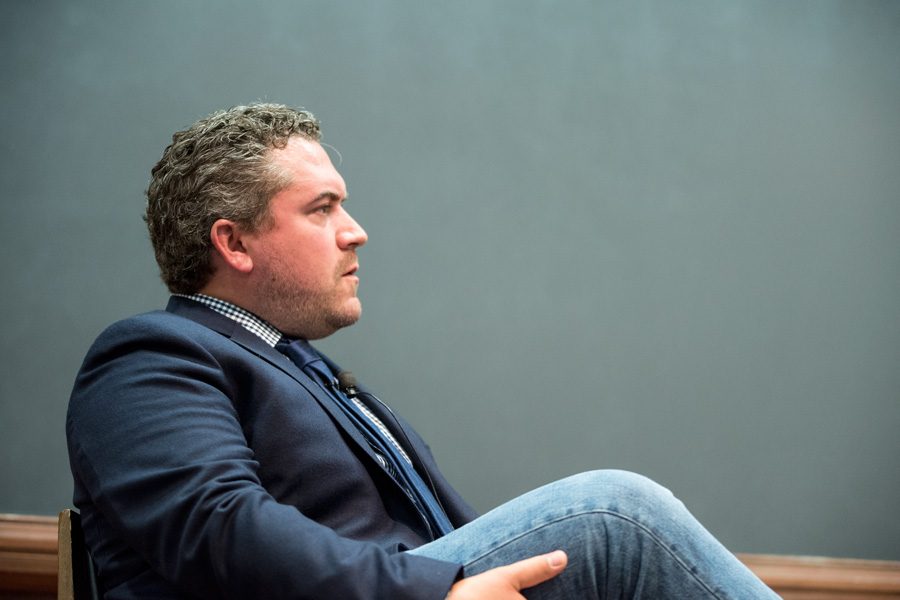NU alumnus Cody Keenan discusses career as Obama’s speechwriter
Colin Boyle/Daily Senior Staffer
Cody Keenan (Weinberg ’02) speaks in Harris Hall at an event sponsored by Contemporary Thought Speaker Series. Keenan served as director of speechwriting for former President Barack Obama from 2013 to 2017.
April 12, 2017
Empathy and curiosity are the two most important qualities for a speechwriter, said Cody Keenan (Weinberg ’02), director of speechwriting for former President Barack Obama.
Speaking to an audience of about 100 in Harris Hall on Tuesday, Keenan discussed what it was like to write speeches for the president of the United States. The event, moderated by Medill Prof. Peter Slevin, was sponsored by Contemporary Thought Speaker Series.
Keenan joined the Obama campaign as an intern in 2007 before becoming the deputy director of speechwriting once Obama took office. In 2013, he was promoted to director of speechwriting, a job he remained in through the end of Obama’s second term.
As a speechwriter, Keenan was tasked with crafting various addresses in the president’s tone, from stump speeches to State of the Union addresses. He said “getting into” Obama’s head was crucial to his job.
At the beginning, when he didn’t know Obama well, Keenan said he would read and watch Obama’s speeches to pick up on language and mannerisms. Eventually, as he worked more closely with the president, he said he was able to move from mimicry to authentic speeches that Obama might write himself.
Still, the president continuously worked with Keenan and his team on drafts by adding in edits and providing feedback — sometimes minutes before the speech was put on the teleprompter, he said.
“We were just vessels for him,” he said. “He was a damn good writer before any of us came around.”
Keenan recalled one particular speech — the one Obama delivered after the Charleston church shooting in June 2015 — where the president cut the last two pages of the draft. Though Keenan had planned on reworking the draft with his team, Obama ended up beating him to it and called him into the White House residence at 10:30 p.m. to present him with the finished speech.
“He had just crossed out the last two pages of the speech entirely and rewritten them by hand about five hours after I’d just killed myself for three days to get him this draft,” Keenan said. “I just typed that up, and that was the speech.”
Obama has an innate ability to read a crowd as he speaks, a trait he uses to his advantage, Keenan said. During Obama’s farewell address, which he delivered on Jan. 10 at McCormick Place in downtown Chicago, Keenan said the president requested the section where he acknowledged his family be moved near the end of the speech.
Keenan said acknowledgements are usually reserved for the beginning of a speech, but the president told him he would be unable to maintain his composure once he started talking about his wife and daughters.
Even then, when the time came to speak about former First Lady Michelle Obama, the president ad-libbed the beginning of the paragraph.
“Michelle LaVaughn Robinson, girl from the South Side,” Obama said during his speech. “For the past 25 years, you’ve been not only my wife and mother of my children, but you’ve been my best friend.”
Obama added in “girl from the South Side.” He knew the crowd’s reaction would be long enough for him to take a breath before speaking again, Keenan said.
This ability to interact with a crowd makes Obama an excellent public speaker, Keenan said, and it comes from a lot of practice and a general sense of intellectual curiosity.
Slevin ended the discussion by reflecting on the speeches Keenan and his team had written over the course of the past nine and a half years.
“Now, 3,577 speeches later, you’ve made it; you’ve made it to the end,” Slevin said. “You end up with a president whose (speeches were) remarkably good in hindsight, as (they were) in the present.”
Hayeon Kim, a Weinberg senior at the event, said she thought Keenan’s anecdotes were insightful.
“It was pretty awesome to hear an intimate perspective of someone who worked so closely with the president, but also to see and hear from someone who wrote the words,” she said.
Email: [email protected]
Twitter: @kristinakarisch












